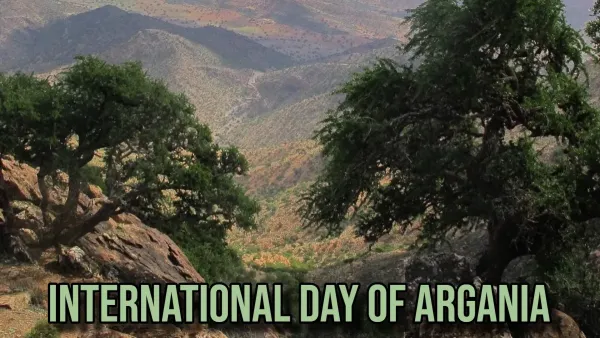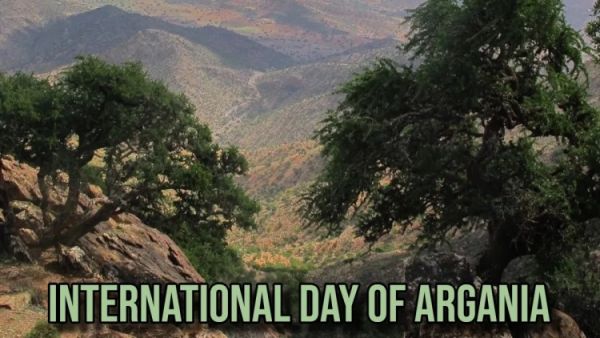
On May 10th, we honour the argan tree (Argania spinosa), a rare and ancient plant indigenous to southern Morocco, as part of the International Day of Argania. This observation, which was declared by the UN General Assembly in 2021, emphasises the cultural and environmental value of the argan tree and its vital role in women’s empowerment, biodiversity preservation, and sustainable development.

Extracted from the tree’s kernels, argan oil—often referred to as “Morocco’s green gold”—has become well-known worldwide for its therapeutic, cosmetic, and culinary uses. Beyond its monetary worth, however, the argan ecosystem is a striking illustration of adaptability, traditional wisdom, and sustainable land use.
The Origins of an International Treasure
Few other tree species can live in Morocco’s harsh and semi-arid areas, where the argan tree has thrived for millions of years. The argan forest, which covers more than 800,000 hectares of land, mostly in the Souss-Massa-Drâa area, is essential for preventing desertification, stabilising the soil, and preserving ecological equilibrium.
The argan biosphere’s ecological and cultural value was further recognised in 1998 when UNESCO designated it as a biosphere reserve. Thousands of rural households depend on the tree for firewood, food, and money, and this ecosystem is home to a wide variety of plants and animals.
In addition to being ingrained in Moroccan soil, argan trees are also integral to the social and economic life of Amazigh (Berber) tribes. Women’s cooperatives, which are crucial to the gathering and processing of argan oil, often oversee and protect the knowledge of argan oil production that has been handed down through the centuries.
The International Day of Argania’s establishment
The United Nations General Assembly formally endorsed Morocco’s proposal to create the International Day of Argania on March 3, 2021, in recognition of the argan tree’s significance on a worldwide scale. The resolution’s support from more than 100 member states demonstrated their common commitment to cultural heritage protection and environmental sustainability.
In cooperation with the Kingdom of Morocco, UNESCO, the Food and Agriculture Organisation (FAO), and other UN organisations lead the celebration. In addition to celebrating, it provides a forum for bringing attention to issues like desertification, climate change, and the role that traditional knowledge systems might play in accomplishing the Sustainable Development Goals (SDGs) of the UN.
A Sign of Climate Resilience and Sustainability
An example of climatic adaptability is the argan tree. It is a vital weapon in the battle against climate change and land degradation because of its capacity to flourish in very dry environments. These concerns are especially pertinent in areas like the Sahel and North Africa that are susceptible to desertification.
In addition to reducing erosion and acting as a carbon sink, the argan forest is essential for preserving hydrological equilibrium. The drought-resistant characteristics of the argan tree provide insights into agroecological methods that might be modified in comparable areas throughout the globe as global temperatures increase and water scarcity worsens.
The maintenance and growth of argan-based agroforestry systems may help nations adopt sustainable land management techniques that protect biodiversity and maintain local livelihoods.
Using Argan Oil to Empower the Economy and Culture
The argan tree has great ecological importance, but it has gained international recognition due to its oil. Rich in vital fatty acids, vitamin E, and antioxidants, argan oil is often referred to as a superfood and miracle cosmetic. Salad dressings, skin moisturisers, shampoos, and anti-ageing creams are just a few of the goods that include it.
With an annual worth of hundreds of millions of dollars, the growing demand for argan oil throughout the world has made it a major source of income for Moroccan rural communities. Importantly, women’s emancipation has been facilitated by the argan industry. Women-led argan oil cooperatives have sprung up all across the area in the last 20 years.
Thousands of women who previously had few economic options now have work, education, and independence thanks to these cooperatives. Additionally, the cooperatives support environmental conservation, fair trade policies, and the preservation of traditional knowledge.
By fusing ancient methods with contemporary markets, these women have transformed into businesswomen, biodiversity stewards, and changemakers who have helped to preserve Morocco’s natural heritage and pull whole communities out of poverty.
International Acknowledgement and Creativity
Sustainable agriculture and scientific research have advanced as a result of argan oil’s popularity. To increase production, fight tree diseases, and preserve the genetic variety of argan populations, Moroccan and international universities, non-governmental organisations, and research institutions are working together.
In order to improve agricultural resilience, the Moroccan government has simultaneously put national initiatives into place, such as the “Green Morocco Plan” and the more recent “Generation Green 2020–2030,” which includes assistance for the argan industry.
Moroccan argan oil was granted Protected Geographical Indication (PGI) status in 2014, a designation that attests to its provenance and age-old manufacturing process. This mark improves Moroccan argan oil’s standing abroad and protects regional producers against fake goods.
In the meanwhile, tourists who are keen to understand the Argan culture from tree to table are drawn to the argan-producing areas by sustainable tourism efforts. This kind of ecotourism encourages environmental education while offering an extra revenue stream.
Obstacles and the Path Ahead
Notwithstanding its achievements, the argan ecosystem still confronts a number of difficulties, including as overgrazing, urbanisation, illicit wood harvesting, and the effects of climate change. Although there are numerous advantages to the growing demand for argan oil, if it is not properly controlled, it may also lead to unsustainable harvesting methods.
Argan forest preservation calls for community-based management strategies, scientific monitoring, and integrated policies that balance ecological integrity with economic growth.
The use of agroforestry and regenerative agriculture models, which imitate natural ecosystems and enhance soil health while preserving production, is one potential avenue. It will also be critical to help local cooperatives with access to markets, technology, and money, as well as to strengthen land rights, particularly for women.
International collaboration will be crucial. For stakeholders throughout the globe, the International Day of Argania provides a crucial chance to renew their pledges, exchange information, and make investments in solutions that guarantee the argan ecosystem’s long-term viability.
A legacy for humanity, a tree for the planet
The argan tree’s tale is one of adaptability, tenacity, and cultural persistence. It serves as a reminder that local people’ stewardship and the knowledge of indigenous customs may often provide answers to the most important environmental and social problems facing the globe.
The argan tree is a potent emblem of what is possible when environment and culture are respected and preserved on this International Day of Argania, as the globe struggles with issues like climate change, biodiversity loss, and rural poverty.
In addition to honouring a Moroccan gem, our celebration of the argan tree reaffirms the world’s commitment to a more resilient, inclusive, and sustainable future.
A Brief Overview of Argania
-Endemic Area: Southwest Morocco – Scientific Name: Argania spinosa
UNESCO Biosphere Reserve (1998) is the biosphere’s current status.
-Oil Uses: Cosmetic, medicinal, and culinary
-Cultural Role: Traditional knowledge handed down through the centuries, mostly by Amazigh women -Economic Impact: Through women-led cooperatives, thousands of employment are supported.
-UN Recognition: In 2021, the UN established the International Day of Argania, which is observed on May 10 every year.
Final Remarks
Generations are fed, healed, and empowered by the argan tree, which towers above its twisted branches and the Moroccan sun. Let the International Day of Argania be a reminder to take care of the environment, promote social justice, and honour cultural heritage.
-
Abhinav Shukla Calls Out Bollywood's Silence On Indo-Pak Tensions: 'Heroes Will Hop At Patriotic Roles For Half Fee After Conflict Is Done'

-
US Secretary Of State Marco Rubio Calls Pakistan Army Chief Asim Munir Amid India-Pak Conflict Spike

-
No need to panic, J-K has adequate supply of essential commodities: Govt

-
Video: Pakistan should be disarmed of its nukes, says Owaisi

-
Shahid Kapoor is now one of top paid actors on OTT, check his fees
